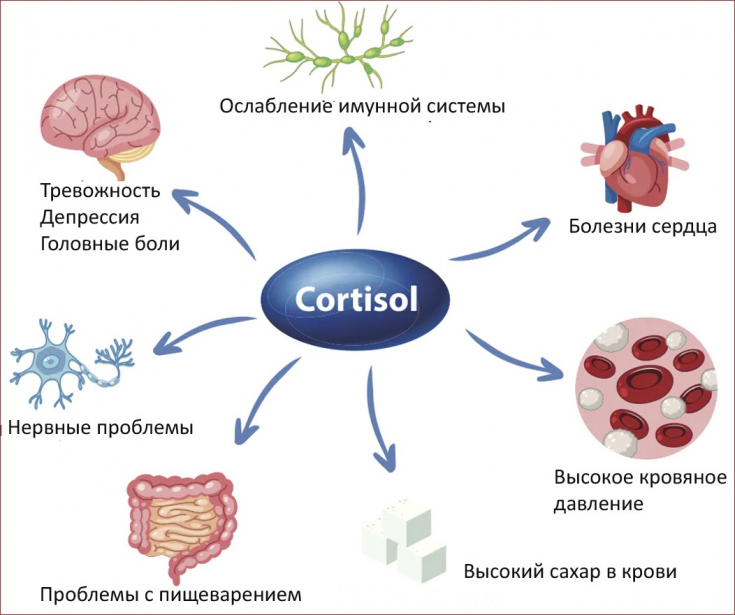Losing weight can be very difficult, especially when, despite all your efforts, the scale does not want to move.
If you're trying to eat right, control your portions, and exercise regularly, but you're not seeing results, high cortisol levels may be the cause of your failures – steroid stress hormone produced by the adrenal glands.
Knowing how this hormone contributes to weight gain and how to reduce cortisol in the body, you can significantly increase your chances of winning the fight against extra pounds.
- How the hormone cortisol is associated with weight gain
- What are the symptoms that will tell you it's time to lower your cortisol levels
- How to lower cortisol levels naturally
How the hormone cortisol is associated with weight gain
The hormone cortisol, produced by the adrenal glands in stressful situations, is involved in the regulation of blood sugar levels, metabolic rate and inflammation in the body. In conditions of constant stress, which is not uncommon in today's world, cortisol is produced frequently, resulting in a chronic increase in the level of this hormone. To avoid the unpleasant consequences of such changes, it is necessary to try to reduce cortisol.
Subscribe to our page on Instagram!

Consequences of excess cortisol are:
- destruction of muscle tissue (which is metabolically active and helps to burn fat; the less muscle tissue in the body, the lower the metabolic rate);
- insulin resistance (causing increased cravings for high-calorie foods);
- disorders in the thyroid gland (which is the most important endocrine organ involved in the regulation of metabolism);
- accumulation of visceral fat (especially in the abdomen);
- deterioration of the state of the cardiovascular and immune systems, etc.
Excess cortisol leads to weight gain and disruption of the body.
Taking into account the negative impact of constantly elevated levels of cortisol on the entire body, estet-portal.com considers it necessary to acquaint you with the following information:
- how elevated cortisol manifests itself;
- how to lower cortisol
in the body. What are the symptoms that will tell you it's time to lower your cortisol levels
If you notice one or more of the following symptoms, it is best to see a doctor. After collecting an anamnesis, examining and conducting the necessary tests, the specialist will tell you in detail how to lower cortisol and whether you need it at all. Remember that the following signs may appear in the presence of dangerous diseases, therefore self-treatment (especially without a diagnosis) – not a way out.
Subscribe to our page on

mood swings;
- constant fatigue;
- irritability, anxiety, depression;
- frequent headaches;
- unexplained weight gain;
- digestion problems;
- frequent constipation or diarrhea;
- frequent urination;
- sleep disorders;
- memory deterioration;
- swelling of the face or limbs;
- menstrual irregularities;
- low libido;
- pain in
- back; decrease in concentration.
- How to Lower Cortisol Naturally
The following methods will help not only to reduce cortisol if its level is elevated, but also to maintain the normal functioning of all body systems, which will have a beneficial effect on your weight and well-being.
- Stay away from stress
- The best way to prevent frequent cortisol surges – reduce the level and frequency of stress in your life. Take a vacation, don't take work on weekends, walk in the fresh air every day, do your favorite hobby, learn to
– anything that helps you calm down and relieve nervous tension is great for lowering cortisol levels. Very often, unhealthy relationships or unloved work become sources of constant stress. Try to soberly assess the situation and get rid of unnecessary stressors in order to improve your life and protect your health.
- Get some exercise

Regular physical activity for 30-60 minutes a day – it's a great way to lower cortisol, balance hormones, improve sleep quality and, of course, keep your body fit. Exercise helps increase muscle mass and speed up metabolism, as well as lower blood sugar levels. Try not to overload yourself – start with simple 10-minute workouts and elementary exercises, increasing the load when you are ready for it.
By exercising regularly, you fight stress and keep your body in shape at the same time.
- Try to get enough sleep
- Healthy sleep is necessary for the body to recover. Constant lack of sleep only increases the negative reaction to constant stress, cravings for junk food and a tendency to rash acts.
Read also:
Sleep well: interesting information about sleep

- Avoid Stimulants
- Remember that coffee (and other caffeinated beverages) under conditions of chronic stress or sleep deprivation only makes things worse by further elevating cortisol levels and negatively impacting dopamine and adenosine levels.
Undoubtedly, in order to avoid the negative impact of increased cortisol on muscle mass, weight and overall body condition, it is best to get rid of chronic stress in life, ensure regular rest and physical activity – so you don't have to worry about how to lower your cortisol levels and you'll be in great shape!
More useful information on our channel in




